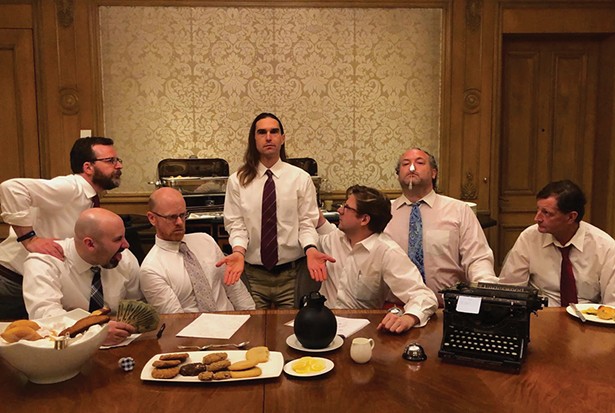
For many musicians who came of age during a certain time (read: us older ones), bringing a typewriter to a gig would have been unthinkably uncool. Sure, maybe we wrote our song lyrics or fanzine reviews on Mom's old IBM Selectric by day or during the overnight hours, but the devices were still chiefly identified with prim secretaries and nerdy college students. With these outmoded office machines now carrying an exotic, steampunk-ish air, however, the Boston Typewriter Orchestra (est. 2004) has embraced their arcane aura: As the name implies, typewriters are the band's central instruments. BTO cofounder Brendan Quigley answered the questions below via email. The group was scheduled to perform on April 25 at the J.J. Newburry Building in Saugerties as part of "Read to Me," an art exhibition sponsored by 11 Jane St. Art Center. That's clearly not happening.
Had you ever considered the typewriter as a musical instrument before the band began? Were you aware of or influenced by any similar instances of antiquated machinery being used to make music?
In short, no. The band started after we heard a friend of ours had unsuccessfully tried to pick up a lady at a bar with the dubious line "I play in the Boston Typewriter Orchestra." When we heard that story, we took it as a challenge to make that happen. As for other acts that use machinery, there's the legendary Einstürzende Neubauten. And a couple of us love a band called Matmos, who make musique concrete out of found instruments. They made one using only their washing machine!
What kind of reactions have you gotten from unaware audience members at your performances?
Since there isn't another all-typewriter band, we don't have to worry about being compared to another. "I liked the BTO, but they're no Suzie QWERTY and the Dvoraks." Most audiences don't know what to expect, and when we hit them with varied, interesting, and fun songs, they're hooked.
How do the reactions between older people who grew up with typewriters versus generations who haven't—and perhaps have never even seen a typewriter before—compare? Any memorable moments?
We let the audience look and play with our typewriters after shows. Many people have come over to me and said, "I wrote my thesis on one of these machines." Kids, obviously, have never seen them before.
What are some of the qualities that make typewriters good instruments? Which are the best makes for making music and why? Since there are no typewriter repair shops left these days (are there?), where do you bring your axe when it needs a tuneup?
Every typewriter makes a different sound. Some shift keys are louder than others, so those tend to be more of the "bass." Each machine's hammer hits the platen a different way. Then we've got bells, carriage returns, and random mechanical keys like "power space." Of course, there's the tried-and-true way of just beating on the frames like a bongo and physically throwing the machines. As you can probably deduce, these things don't have a long shelf life with us. Any repairs, assuming they can be salvaged, are done in-house. I've lost at least five machines so far.
For you, as a noted professional crossword puzzle constructor (New York Times, Washington Post, others) and a musician who'd previously played in other bands (Campaign for Real Time, Hip Tanaka), being in the BTO brings your worlds of writing and music together in a singular way. Does this give you an edge within the band that your bandmates may lack? And, to be even more meta, have you ever read back any of the text you've typed out during your performances? If so, what did it say? Are BTO's pieces "composed" for the typewriters' keyboards, or do you just hit random keys, with the tunes being more about the percussive element?
The first thing we do with all machines is remove the ribbons, so we're not typing anything per se. It's entirely whatever noises we can coax out of the machines. All the songs are composed, though some are more structured than others. All the vocal numbers are locked in, whereas some of the instrumental pieces are more "improvisational," with structure. There's a lot of musical background, actually. [Members] Derrik Albertelli plays guitar in a metal band; Chris Webb was in a post-punk band; Jeff Breeze has been in radio for over 25 years and does the odd experimental show; Jay O'Grady was a DJ; Alex Holman is the only one without direct experience. He's just naturally twitchy.
For those who are unsure about attending your Saugerties performance because they might be skeptical about the idea of a group of people making music on a bunch of old typewriters, what would you say to entice them to attend?
We've been taking care of business. Every day. And working overtime.












